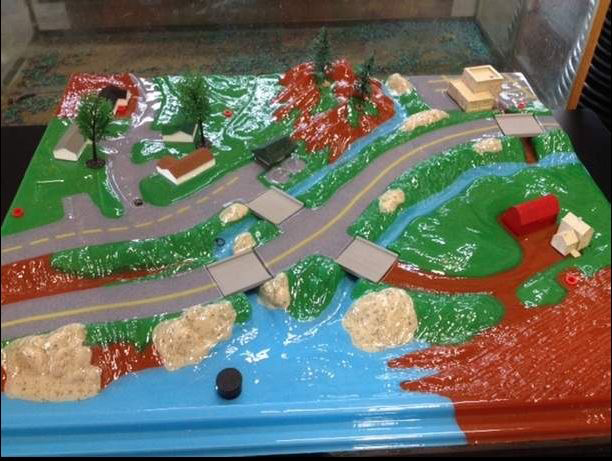
Hands-on. The Chip Holt Nature Center recently purchased an Enviroscape using a grant from the Guido and Ellen Palma Foundation. An Enviroscape is a hands-on demonstration model of how water flows into Conesus Lake from the surrounding area. Credit: Livingston County News.
— Matt Leader, Livingston County News
December 12, 2016 - A $25,000 New York Sea grant will help fund the construction of a 500-square-foot rain garden as well as the installation of two, 50-gallon rain barrels and the restoration of about 400 feet of shoreline at Vitale Park on Conesus Lake.
Awarded to the Livingston County’s Planning Department, which will work in collaboration with the town of Livonia to make the park upgrades, the project also includes an interpretive public education kiosk in an effort to educate the public about the importance of shoreline preservation and maintaining lake water quality.
“The town is very interested in employing green infrastructure and shoreline restoration to ameliorate water quality in Conesus Lake and downstream and serving as an educational model for future projects elsewhere,” said Livonia Town Supervisor Eric Gott in a statement. “We look forward to working with the Livingston County Planning Department and all involved stakeholders on this project.”
A landowner how-to booklet for shoreline restoration, lake friendly landscaping guidelines and green infrastructure plans will be developed to accompany the Conesus Lake Watershed Council’s newly developing public education campaign intended to give lakefront land owners the tools they need to protect the lake’s shore and water quality.
Linda Artruc, a member of the Chip Holt Nature Center’s Board of Trustees, said the center has been part of the discussion with the Conesus Lake Association and the town of Livonia on making the north end of Conesus Lake more of an educational hub for the Finger Lakes with information about watershed protection and best management practices on hand.
“We are excited to hear about their grant to create a water garden and for the purchase of rain barrels,” said Artruc. “It will be great to model, for the community, strategies that they can implement in their own yards and business to help protect our lake.”
The nature center has a long range plan to become more of an interpretive center with hands-on activities for visitors, recently piloting some open house hours this past summer on Saturdays throughout July and August.
“Several environmentally themed games and activities have been created for visitors to sign out,” Artruc said. “We also have recently purchased new chairs, a lab table and an Enviroscape watershed model with the help of a grant received from the Guido and Ellen Palma Foundation.”
The Enviroscape is a hands-on demonstration model of how water flows into Conesus Lake from the surrounding area, potentially carrying with it pesticides, fertilizers, road salt and farm runoff.
“It’s our goal to continue to provide free environmental and nature based programming to the community,” said Artruc.
The first of the center’s annual “Nature of Things” series will be Jan. 20.
Department of Environmental Conservation Wildlife Biologist Scott Smith will speak about fishers, a large predator in the weasel family that is found in New York.
The program is free and will run from 7 to 8 p.m.
Anyone interested in getting involved with the nature center can contact Artruc at chipholtnaturecenter@yahoo.com.
More Info: New York Sea Grant
New York Sea Grant (NYSG), a cooperative program of Cornell University
and the State University of New York (SUNY), is one of 33 university-based
programs under the National Oceanic and Atmospheric Administration’s
National Sea Grant College Program.
Since 1971, NYSG has represented a statewide network of integrated
research, education and extension services promoting coastal community
economic vitality, environmental sustainability and citizen awareness
and understanding about the State’s marine and Great Lakes resources.
Through NYSG’s efforts, the combined talents of university scientists
and extension specialists help develop and transfer science-based
information to many coastal user groups—businesses and industries,
federal, state and local government decision-makers and agency managers,
educators, the media and the interested public.
The program maintains Great Lakes offices at Cornell University, SUNY
Buffalo, SUNY Oswego and the Wayne County Cooperative Extension office
in Newark. In the State's marine waters, NYSG has offices at Stony Brook
University in Long Island, Brooklyn College and Cornell Cooperative
Extension in NYC and Kingston in the Hudson Valley.
For updates on Sea Grant activities: www.nyseagrant.org has RSS, Facebook, Twitter, and YouTube links. NYSG offers a free e-list sign up via www.nyseagrant.org/nycoastlines for its flagship publication, NY Coastlines/Currents, which is published quarterly. Our program also produces an occasional e-newsletter,"NOAA Sea Grant's Social Media Review," via its blog, www.nyseagrant.org/blog.